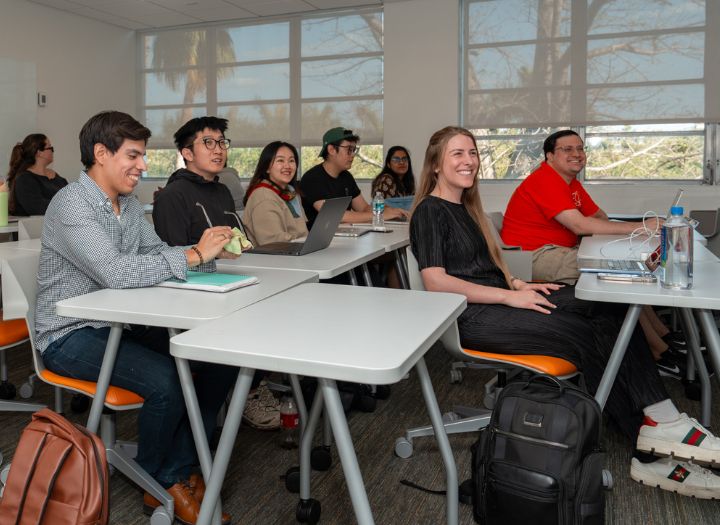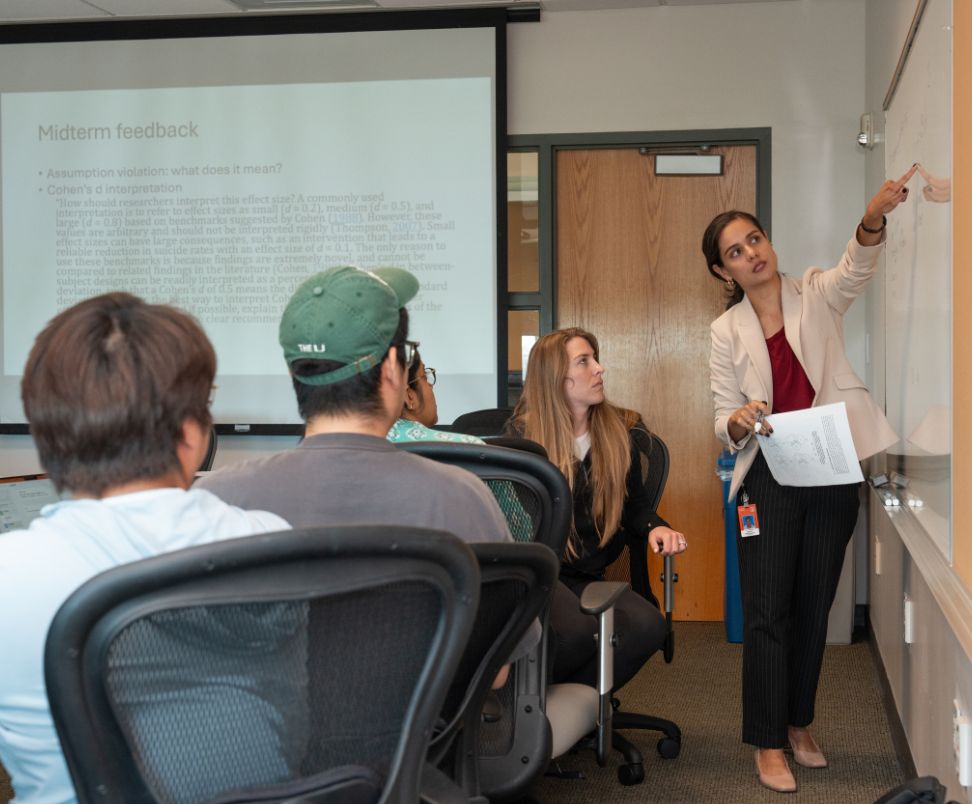Graduate FAQs
Learn how you can join an innovative graduate program at the University of Miami School of Communication.

About the Admissions Process
About our Graduate Programs
We accept new doctoral and master’s students only for the fall semester. The application deadlines for the fall semester are:
Doctoral Program:
- Final Deadline: December 1
Master’s Programs:
- Priority Deadline: February 1
- Final Deadline: July 15
* For international applicants to master programs, please submit your application before March 15th. We cannot guarantee that international applications submitted after March 15 will be processed due to time limitations.
Students can start the Media Management Certificate either in the fall or spring.
Certificate Program:
- Spring Deadline: December 15
- Priority Deadline: February 1
- Final Deadline: July 15
- M.A. Application Process – Learn more
- M.S. Application Process – Learn more
- M.F.A. Application Process – Learn more
- Ph.D. Application Process – Learn more
- Certificate Application Process – Learn more
A minimum GPA of 3.0 is required.
Click below to learn more about the application requirements by program:
The Graduate Record Exam (GRE) and the Graduate Management Admission Test (GMAT) are not required for any School of Communication program. Students are welcome to submit the GRE or GMAT but the exams are not required.
- The University of Miami’s GRE code is 5815
- The University of Miami’s GMAT code is 7NV-S1-96
English language proficiency requirements, accepted exams, and minimum scores are outlined on the International Student Applicant Page.
For the purpose of initial application review process, the Office of Graduate Studies accepts unofficial transcripts from all post-secondary institutions; however, official transcripts must be submitted upon admission.
Official transcripts of all college work, both undergraduate and graduate, are required.
International students are required to submit the following items:
- Official / original transcripts with professional certified English translation
- A copy of your diploma with professional certified English translation for degrees earned outside of the United States.
- A copy of passport
- Domestic or international applicants that have attended (or have academic credits from) an international institution must have any educational credentials earned outside the United States verified by an approved international credentialing evaluation service. Applicants are encouraged to submit an international transcript evaluation along with their transcripts from one of the approved University of Miami vendors found on this list.
If you do not already have an international transcript evaluation, the Office of Graduate Studies will obtain it. The international credentialing evaluation service can take several weeks. We strongly encourage international students to apply and submit all transcripts early for timely decision-making.
Each of the University’s eleven schools and colleges has specific procedures that must be followed by international applicants. Visit the School of Communication’s International Credentials page for more information.
The M.S. in Experience and Information Design, the M.F.A. in Motion Pictures, the M.F.A. in Interactive Media, and the M.F.A. in Documentary require portfolios. Please refer to the program pages for guidelines.
It may be appropriate to ask professors, advisors, and/or employment supervisors for recommendations. There is no specific combination of the above that is required. Recommendations from friends are not suitable.
Contact information for recommenders should be submitted online via the online applications system. Recommenders will then be notified via email that you have requested a recommendation as part of the application requirement. Recommenders can complete the online questionnaire and attach a letter, although a letter is not required.
Classification of Instructional Programs (CIP) codes are six-digit numbers that identify academic programs, courses, certificates, and degrees in the United States. Relevant CIP codes are listed below:
- 09.0903 – Advertising
- 50.1001 – Arts, Entertainment, and Media Management, General
- 50.0602 – Cinematography and Film/Video Production
- 09.0100 – Communication, General
- 09.0101 – Communication Studies/Speech Communication and Rhetoric
- 09.0702 – Digital Communication and Media/Multimedia
- 50.0607 – Documentary Production
- 11.0105 – Human-Centered Technology Design
- 09.0907 – International and Intercultural Communication
- 09.0401 – Journalism
- 09.0902 – Public Relations/Image Management
The School of Communication offers the following graduate programs:
Doctor of Philosophy (Ph.D)
Master of Fine Arts (M.F.A.)
Master of Arts (M.A.)
- Advertising
- Communication for Global Social Change
- Communication Studies
- Journalism
- Public Relations
Master of Science (M.S.)
Graduate Certificate
- Advertising, M.A. – 2 years
- Communication, Ph.D. – 4 years
- Communication Studies, M.A. – 2 years
- Communication for Global Social Change, M.A. – 1 year
- Documentary, M.F.A. – 2 years
- Experience and Information Design, M.S. – 18 months
- Interactive Media, M.F.A. – 2 years
- Journalism, M.A. – 18 months
- Media Management, M.S. – 1 year
- Motion Pictures, M.F.A. – 3 years
- Public Relations, M.A. – 2 years
No, we do not currently offer online programs.
Most of our master’s programs allow students to take classes on a part-time basis.
The Communication, Ph.D. program is only for full-time students.
Please click here to view the estimated cost of attendance.
International students who are accepted into the graduate programs will be required to submit an original bank letter of financial stability in the amount to cover all expenses for the first year of study.
Master’s Programs:
Most programs have a very limited number of graduate assistantships available. When you apply for admission to a graduate degree program in the School of Communication by the priority deadline (Feb 1st), you are given top consideration for SoC funding opportunities. All applicants, including those who live in the United States, as well as international applicants, are eligible for these awards. This funding is typically awarded to those who submit an exceptionally strong application and have exhibited a demonstrated ability to contribute to their field.
Even if the priority deadline of Feb 1st has passed, you may still be considered and are welcome to apply.
A separate application for SoC financial awards is required and includes a short essay (no more than 1 page) that responds to a series of prompts provided in the portal. In lieu of a written statement, applicants are welcome to submit your response to the prompts in a form of media (no longer than 2 minutes), such as an audio or video statement, creative work, or multi-media project (any format)
The application for School of Communication financial awards, such as graduate assistantships and partial tuition waivers, should be submitted to the Graduate School Application portal.
Communication, Ph.D. Program:
School of Communication doctoral students are fully funded for four years. The costs covered for our doctoral students for four consecutive years are as follows: tuition for the required 60 credit hours, a $36,225 stipend per year for four years, and the cost of University health insurance for four years, all contingent on adequate progress in the four years of the program.
Learn more on the Graduate Funding Opportunities page.
For questions related to the application process, please email the Graduate Studies Office:
- Email: socgrad@miami.edu
- Phone: (305) 284-5236
For questions specific to a program, please contact the Graduate Program Director.
Advertising
Monica Duran – Graduate Program Director
Communication Studies
Nicholas Carcioppolo – Graduate Program Director
Communication for Global Social Change
Karin Wilkins – Dean of the School of Communication
Doctoral Program
Christina Lane – Associate Dean for Graduate Studies
Documentary
Sanjeev Chatterjee – Graduate Program Director
Experience and Information Design
Barbara Millet – Graduate Program Director
Journalism
Rachel Mourão, Graduate Program Director
Interactive Media
Lindsay Grace – Graduate Program Director
Media Management
Michel Dupagne – Graduate Program Director
Motion Pictures
Ed Talavera – Graduate Program Director
Public Relations
Weiting Tao – Graduate Program Director
Students can transfer only 6 credits for 30-credit programs and only 9 credits for 36-credit programs, but conditions apply as follows:
- Can transfer only 6 credits for 30-credit and only 9 credits for 36-credit programs.
- Credits with grades of “B-” or less cannot be transferred.
- Credits for courses over 6 years old, or taken by extension, cannot be transferred.
- Credits that have been counted toward another degree cannot be transferred.
In addition, official transcripts must be submitted to transfer credits, and transferred credits will not be calculated into the University of Miami GPA.
The Communication, Ph.D. program accepts about 6 students each year.
Students who earned their undergraduate degree in the same program at UMiami may encounter overlapping coursework at the graduate level. If you’re applying to a different program or earned your undergraduate degree elsewhere, this is less likely to be an issue. Please connect with the Graduate Program Director to discuss your individual situation.
Advertising
Communication Studies
Communication for Global Social Change
Journalism
Public Relations
We’re here to help
Graduate Studies Office
Email: socgrad@miami.edu
Phone: (305) 284-5236
Fax: (305) 284 – 8701






